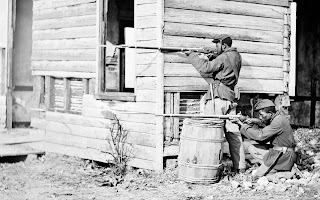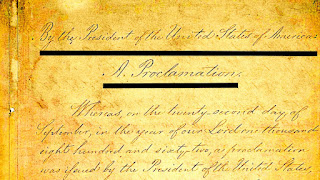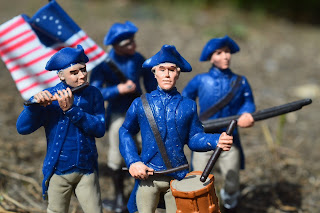American Civil War || Reasons Of Civil War ||The Civil War in Virginia ||Emancipation Proclamation ||Union Victory
In this blog, I will tell you the Reasons Of Civil War and the results of the American Civil War...
Reasons for the Civil War
During the nineteenth 100 years, while the United States was
encountering a time of huge development, a major monetary distinction existed
between the nation's northern and southern districts.
In the North, assembling, and industry was deep-rooted, and
horticulture was, for the most part, restricted to limited scope ranches, while
the South's economy depended on an arrangement of huge scope cultivating that
relied upon the work of Black oppressed individuals to develop specific yields,
particularly cotton and tobacco. Developing abolitionist opinion in the North
after the 1830s and northern resistance to subjugation's augmentation into the
new western domains drove numerous southerners to expect the presence of
bondage in America — and consequently the foundation of their economy — was in
harm's way.
The Civil War in Virginia (1862)
George B. McClellan-who supplanted the maturing General
Winfield Scott as incomparable commandant of the Union Army after the main
months of the conflict was dearest by his soldiers, yet his hesitance to
progress baffled Lincoln. In the spring of 1862, McClellan, at last, drove his
Army of the Potomac up the promontory between the York and James Rivers,
catching Yorktown on May 4. The consolidated powers of Robert E. Lee and
Jackson effectively drove back McClellan's military in the Seven Days Battles
(June 25-July 1), and a wary McClellan called for yet more fortifications to
move against Richmond. Lincoln rejected, and on second thought pulled out the
Army of the Potomac to Washington. By mid-1862, McClellan had been supplanted
as Union general-in-boss by Henry W. Halleck, however, he stayed in charge of
the Army of the Potomac.
Lee then moved his soldiers northwards and split his men,
sending Jackson to meet Pope's powers close to Manassas, while Lee himself
moved independently with the last part of the military. On August 29, Union
soldiers drove by John Pope and struck Jackson's powers in the Second Battle of
Bull Run (Second Manassas). The following day, Lee hit the Federal left flank
with a monstrous attack, driving Pope's men back towards Washington. Closely
following his triumph at Manassas, Lee started the principal Confederate
intrusion of the North. Regardless of problematic orders from Lincoln and
Halleck, McClellan had the option to revamp his military and strike at Lee on
September 14 in Maryland, driving the Confederates back to a protective
situation along Antietam Creek, close to Sharpsburg.
On September 17, the Army of the Potomac hit Lee's powers
(built up by Jackson) in turned into the conflict's bloodiest single day of
battling. Absolute losses at the Battle of Antietam (otherwise called the
Battle of Sharpsburg) numbered 12,410 of nearly 69,000 soldiers on the Union
side, and 13,724 of around 52,000 for the Confederates. The Union triumph at
Antietam would demonstrate conclusive, as it ended the Confederate development
in Maryland and constrained Lee to withdraw into Virginia. In any case,
McClellan's inability to seek after his benefit acquired him the hatred of
Lincoln and Halleck, who eliminated him from order for Ambrose E. Burnside.
Burnside's attack on Lee's soldiers close to Fredericksburg on December 13
finished in weighty Union setbacks and a Confederate triumph; he was speedily
supplanted by Joseph "Battling Joe" Hooker, and the two militaries
subsided into winter quarters across the Rappahannock River from one another.
After the Emancipation Proclamation (1863-4)
Lincoln had utilized the event of the Union triumph at
Antietam to give a starter Emancipation Proclamation, which liberated all
subjugated individuals in the defiant states after January 1, 1863. He
legitimized his choice as a wartime measure and didn't venture to such an
extreme as to free the subjugated individuals in the line states faithful to
the Union. In any case, the Emancipation Proclamation denied the Confederacy the heft of its workforces and placed worldwide general assessment
unequivocally on the Union side. About 186,000 Black Civil War officers would
enlist in the Union Army when the conflict finished in 1865, and 38,000 lost
their lives.
In the spring of 1863, Hooker's arrangements for a Union
hostile were foiled by an unexpected assault by the heft of Lee's powers on May
1, whereupon Hooker pulled his men back to Chancellorsville. The Confederates
acquired an exorbitant triumph in the Battle of Chancellorsville, experiencing
13,000 setbacks (around 22% of their soldiers); the Union lost 17,000 men (15
percent). Lee sent off one more intrusion of the North in June, going after
Union powers directed by General George Meade on July 1 close to Gettysburg, in
southern Pennsylvania. After more than three days of wild battling, the Confederates
couldn't push through the Union place and endured setbacks from near 60%.
Meade neglected to counterattack, nonetheless, and Lee's
leftover powers had the option to escape into Virginia, finishing the last
Confederate intrusion of the North. Likewise in July 1863, Union powers under
Ulysses S. Award took Vicksburg (Mississippi) in the Siege of Vicksburg, a
triumph that would end up being the defining moment of the conflict in the
western theater. After a Confederate triumph at Chickamauga Creek, Georgia,
only south of Chattanooga, Tennessee, in September, Lincoln extended Grant's
order, and he drove a supported Federal armed force (counting two corps from
the Army of the Potomac) to triumph in the Battle of Chattanooga in late
November.
Toward a Union Victory (1864-65)
In March 1864, Lincoln put Grant in preeminent order of the
Union militaries, supplanting Halleck. Leaving William Tecumseh Sherman in
charge in the West, Grant made a beeline for Washington, where he drove the Army
of the Potomac towards Lee's soldiers in northern Virginia. In spite of weighty
Union losses in the Battle of the Wilderness and at Spotsylvania (both May
1864), at Cold Harbor (early June), and the key rail focus of Petersburg
(June), Grant sought after a procedure of wearing down, putting Petersburg
under attack for the following nine months.
Sherman outsmarted Confederate powers to take Atlanta by
September, after which he and around 60,000 Union soldiers started the popular
"Walk to the Sea," destroying Georgia en route to catching Savannah
on December 21. Columbia and Charleston, South Carolina, tumbled to Sherman's
men by mid-February, and Jefferson Davis behind schedule gave over the
incomparable order to Lee, with the Confederate conflict exertion hanging on by
a thread. Sherman pushed on through North Carolina, catching Fayetteville, Bentonville,
Goldsboro, and Raleigh by mid-April.
In the meantime, depleted by the Union attack of Petersburg
and Richmond, Lee's powers took a stab at obstruction, going after and catching
the Federal-controlled Fort Stedman on March 25. A prompt counterattack
switched the triumph, in any case, and on the evening of April 2-3, Lee's powers
emptied Richmond. For the vast majority of the following week, Grant and Meade
sought after the Confederates along the Appomattox River, at long last
depleting their opportunities for escape. Award acknowledged Lee's acquiescence
at Appomattox Court House on April 9. Just before the triumph, the Union lost its
extraordinary chief: The entertainer and Confederate supporter John Wilkes
Booth killed President Lincoln at Ford's Theater in Washington on April 14.
Sherman accepted Johnston's acquiescence at Durham Station, North Carolina on
April 26, actually finishing the Civil War.









0 Comments
If you want me to publish history that you like so tell me freely...